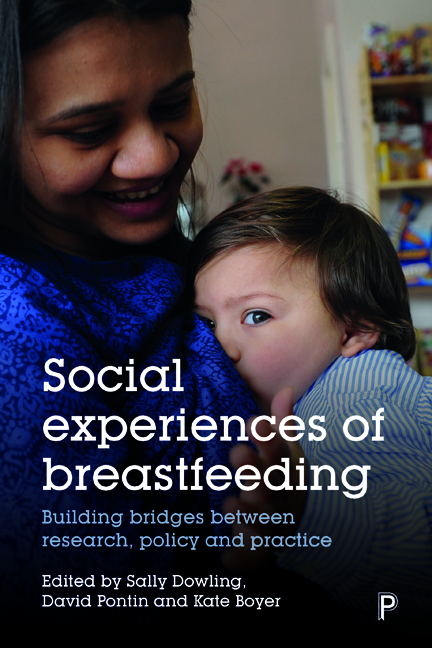Book contents
- Frontmatter
- Dedication
- Contents
- List of tables and figures
- Notes on contributors
- Acknowledgements
- Introduction
- The UK policy context: reconfiguration of the Unicef UK Baby Friendly Initiative to reflect the importance of relationships and ensuring sustainability
- Part I Breastfeeding and emotions
- Part II Cultures of breastfeeding
- Part III Breastfeeding and popular culture
- Conclusion
- Appendix: Schedule for ESRC Seminar Series: Social Experiences of Breastfeeding: Building bridges between research and policy, 2015–16
- Index
seven - Breastfeeding and modern parenting culture: when worlds collide
Published online by Cambridge University Press: 22 April 2022
- Frontmatter
- Dedication
- Contents
- List of tables and figures
- Notes on contributors
- Acknowledgements
- Introduction
- The UK policy context: reconfiguration of the Unicef UK Baby Friendly Initiative to reflect the importance of relationships and ensuring sustainability
- Part I Breastfeeding and emotions
- Part II Cultures of breastfeeding
- Part III Breastfeeding and popular culture
- Conclusion
- Appendix: Schedule for ESRC Seminar Series: Social Experiences of Breastfeeding: Building bridges between research and policy, 2015–16
- Index
Summary
Introduction
The decision to breastfeed or feed with infant formula does not occur in a vacuum. As important as infant feeding decisions are for infant and maternal health, they are but one part of infant care. Modern parents are under considerable pressures. Responsibilities both in the home and in the workplace, coupled with the increasing likelihood of being dispersed from close family, can lead to new mothers feeling overwhelmed by the demands of caring for an infant alone. Many report feeling anxiety, tedium or even regret at their new lives and identities. Caring for newborn infants is often overwhelming; with frequent needs for feeding, comfort and general care, it is not surprising that new mothers can feel overloaded. What was once shared within wider communities, with the support of extended family and likeminded peers, is now often an isolated task.
The combination of maternal isolation and modern lifestyle pressures has paved the way for a multimillion-pound baby care book market, with self-styled experts promising new parents structure to their day, ‘control’ of their infant and, importantly, time for themselves. Infants, according to these authors, can be trained to feed less frequently, sleep through the night and need little interaction during the day. But what is the evidence base for these books? Do they work? And importantly, what is their impact on mothers and babies? We know that responsive care has the best outcomes for infants – socially, emotionally and educationally. We also know that breastfeeding works best when mothers are responsive, feeding to their infant's cues of hunger and satiety rather than a set routine. Conversely, the pressures on modern parents, and the impact of exhaustion and isolation upon maternal wellbeing, are also clear.
This chapter explores this complex issue by looking at the drivers for parents adopting strict infant routines, alongside the potential impact of this on breastfeeding success. It considers what changes are needed at a societal level to enable both breastfeeding to succeed and maternal wellbeing to be protected.
The transition to motherhood
When a baby is born, so is a mother, and as natural as this process is, this does not mean it is easy, particularly in modern times. The dispersion of families in Western culture means that many younger adults have little experience of caring for infants.
- Type
- Chapter
- Information
- Social Experiences of BreastfeedingBuilding Bridges between Research, Policy and Practice, pp. 131 - 146Publisher: Bristol University PressPrint publication year: 2018

